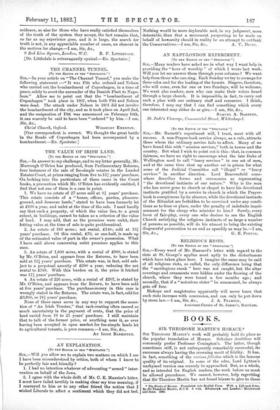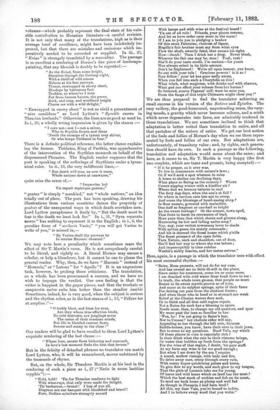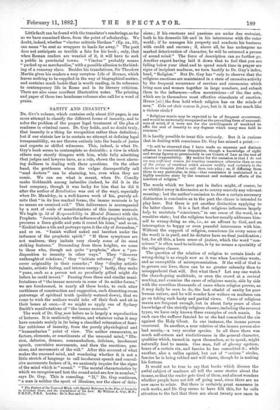BOOKS.
SIR THEODORE MARTIN'S HORACE.*
SIR THEODORE MARTIN'S work will probably hold its place as the popular translation of Horace. Scholars doubtless will commonly prefer Professor Conington's. The latter, though sometimes stiff, is not unfrequently remarkably successful, its successes always having the crowning merit of fidelity. It has, in fact, something of the curiosa felicitas which is the famous quality of its original. In some of the odes, Lord Lytton's unrhymed version can scarcely be approached. But, as a whole, and as intended for English readers, the work before us must be allowed precedence. We cannot, however, help regretting that Sir Theodore Martin has not found leisure to give to these • The Works of Horace. Translated into iinglish Vera. With a Life and Nobs. By Sir Theodore Martin, S.O.B. 2 vols. Bdixtbargk and London : Blackwood and Bons. 1881.
volumes—which probably represent the final state of his valu- able contribution to Horatian literature—a careful revision. It is not only that many of the translations, high as is their average level of excellence, might have been indefinitely im- proved, but that there are mistakes and omissions which im- peratively needed to be corrected or supplied. In iii., 25, " Evias " is strangely translated by a masculine. The passage is so excellent a rendering of Horace's fine piece of landscape- painting, that any blemish is doubly to be regretted :—
" As the Eviad, from some height, Sleepless through the livelong night, With a thrill of wild amaze
Hebrus at his feet surveys, Thrace, enwrapped in snowy sheet, Rhodope by barbarous feet Trodden, so where'er I rove Far from human haunts, the grove, Rock, and crag, and woodland height Charm me with a wild delight."
"Enwrapped in snowy sheet" is not so vivid a presentment of " nive candid= " as Lord Lytton's " Sparkle snows in Thracian lowlands." Otherwise, the lines are as good as need be. In i., 26, a wholly, wrong impression is given by the stanza :- " I care not—not I—not a stiver, Who in Scythia frozen and drear
'Neath the scourge of a tyrant may shiver, Or who keeps Tiridates in fear."
There is a definite political reference, the latter clause explain- ing the former. Tiridates, King of Parthia, was apprehensive of the intervention of the Scythian monarch on behalf of the dispossessed Phraates. The English reader supposes that the poet is speaking of the sufferings of Scythians under a tyran- nical ruler. In ii., 13, the very indifferent lines,-
" Bat death will tear, as now it tears, Whole nations down at unawares," quite miss the sense of,—
"Improvisa leti
Vis rapuit rapietque gentes ;"
" gentes " is simply " mankind," not " whole nations," an idea
totally out of place. The poet has been speaking, drawing his illustrations from various countries (hence the propriety of genies) of the unexpected ways in which death overtakes men.
Lord Lytton paraphrases it finely by, " But the death most to fear is the death we least look for." In i., 31, " Syra reparata metre" has nothing to represent it in the English ; in i., 6, the peculiar force of "scriberis Vario," "you will get Varius to write of you," is missed in,-
" By Varius shall tby prowess be In strains Maeonic chanted."
We may note here a peculiarity which sometimes mars the effect of Sir T. Martin's verse. He is not scrupulously careful to be literal, and rightly so. A literal Horace may amuse a scholar, or help a blunderer, bat it cannot be one to please the general reader. Why, then, do we have " Maeonic " instead of " Homeric," or " Latous " for " Apollo "? It is an ungracious task, however, to prolong these criticisms. The translation, as a whole, has been pronounced a success, and we have no wish to impugn the verdict. Our own feeling is that the writer is happiest in the gayer pieces, and that the trochaic or anapaestic metre snits him better than the steadier .iambic Sometimes, indeed, he is very good, when the subject is serious
and the rhythm sober, as in the last stanza of i., 13, "Fakes ter et amplius :"—
" 0 trebly blest, and blest for ever, Are they whom true affection binds, No cold distrusts, nor janglings sever The union of their constant minds, But life in blended current flows, Serene and sunny to the close !"
Our readers will be glad to have recalled to them Lord Lytton's exquisite rendering of the last clause :-
" Whose love, secure from bickering and reproach, In love's last moment finds the first that severs."
But in the felicity of detached phrases no translator can match Lord Lytton, who, it will be remembered, moves unfettered by the trammels of rhyme.
But, on the whole, Sir Theodore Martin is at his best in the rendering of such a piece as i., 27 ("Natis in usum laetitiae scyphis ") :-
" Hold, bold! 'Tis for Thracian madmen to fight With wine-cups, that only were made for delight. 'Tis barbarous,—brutal ! I beg of you all, Disgrace not our banquet with bloodshed and brawl ! Sure, Median scimitars strangely accord
With lamps and with wine at the festival board !
'Tis out of all rule ! Friends, your places resume, And let us have order once more in the room !
If I am to join you in pledging a beaker Of this stout Falernian, choicest of liquor, Megilla's fair brother must say from what eyes Flew the shaft, sweetly fatal, that causes his sighs.
How—dumb! Then I drink not a drop. Never blush, Whoever the fair one may be, man ! Tush, tush !
She'll do your taste credit, I'm certain—for yours Was always select in its little amours.
Don't be frightened ! We're all upon honour, you know,
So out with your tale ! Gracious powers ! is it so ?
Poor fellow ! your lot has gone sadly amiss, When you fell into such a Charybdis as this !
What witch, what magician, with drinks and with charms, What god can effect your release from her harms ?
So fettered, scarce Pegasus' self, were he near you, From the fangs of this triple Chimaera might clear you !"
We are thus prepared to find the translator achieving no small success in his version of the Satires and Epistles. The easy raillery, the good-humoured, unpretending sense, the vary- ing moods, a gravity which never becomes solemn, and a mirth which never degenerates into farce, are admirably rendered in these translations. We are sometimes inclined to think that adaptation is better suited than translation to satire, and all that partakes of the nature of satire. We get our best notion of the fools and follies of Horace's day when we see them repre- sented by fools and follies of our own. But adaptations are, unfortunately, of transitory value ; and, by rights, each genera- tion should have its own. In such a passage as the following, translation and adaptation would mean about the same ; and here, as it seems to us, Sir T. Martin is very happy (the first two couplets, which are tame and prosaic, being excepted) :— " If it be proper, as it ever was,
To live in consonance with nature's laws ; Or if we'd seek a spot whereon to raise A home to shelter our declining days, What place so fitting as the country ? Where
Comes nipping winter with a kindlier air ?
Where find we breezes balmier to cool The fiery dog-days, when the sun's at full ?
Or where is envious care less apt to creep, And scare the blessings of heart-easing sleep ?
Is floor mosaic, gemmed with malachite, One-half so fragrant or one-half so bright As the sweet herbage ? Or the stream, town-sped, That frets to burst its cerements of lead, More pure than that which shoots and gleams along, Murmuring its low and lulling under-song ?
Nay, nay, your veriest townsman loves to shade With sylvan green his stately colonnade ; And his is deemed the finest house which yields The finest prospect of the open fields. Turn Nature, neck and shoulders, out of door, She'll find her way to where she was before ; And imperceptibly in time subdue Wealth's sickly fancies, and her tastes untrue."
Here, again, is a passage in which the translator uses with effect his most successful rhythm :—
"Baiae, Musa protests, will not do for my case,
And has caused me no little in the place, Since under his treatment, come ice or come snow, I am douched with cold water from head down to toe : In truth, the whole town groans, that people no more Resort to its sweet myrtle.groves as of yore, And sneer at its sulphur springs, spite of their fame For driving out pain from the shakiest frame ;
And when those who in bead or in stomach are weak
Relief at the Clusian waters dare seek, Or to Gabii and all that cold region repair,
Not a Baian for such has a blessing to spare.
Needs must, then, to change my old quarters, and spur-
My mare past the inns so familiar to her.
Woo, ho ! I'm not going to Baiae's bay, Nor to Comae!' her choleric rider will say, Appealing to her through the left rein, because Saddle-horses, you know, have their ears in their jaws..
But to come to my questions. Good Vela, say which Of these places in corn is especially rich ?
Is their drink what the rain to their cisterns brings, Or water that bubbles up fresh from the springs ?
For the wine of that region, I doubt, 'tiff poor stuff.
At my farm any wine is for me good enough ; But when I am down by the sea I require A sound, mellow vintage, with body and fire, To drive away care, creep through every vein, With sunny hopes quickening pulses and brain, To give How to my words, and such glow to my tongue,. That the girls of Lncania take me for young. Of hares and wild boars which on land has the most ?
Which the best stock of urchins and fish on its coast, To send me back home as plump and well fed As though in Pheaacia I had been bred ?
All this, my dear Vale, you're bound to indite, And I to believe every word that you write.'
Little fault can be found with the translator's renderings, as far as we have examined them, from the point of scholarship. We doubt, indeed, whether " vinctus mittens Ilerdam " (Ep. xx., 13), can mean "be sent as wrappers to lands far away." The poet does not anticipate so terrible a fate for his book ; only, that when Roman readers are wearied of it, it will have to seek a public in provincial towns. " Vinctus " probably means " packed up as merchandise," with a possible allusion to the bind- ing of a runaway slave. Besides his translations, Sir Theodore Martin gives his readers a very complete. Life of Horace, which leaves nothing to be supplied in the way of biographical matter, and contains much beside that is worth reading, in its reference to contemporary life in Rome and in its literary criticism. There are also some excellent illustrative notes. The printing and paper of these two handsome volumes also call for a word of praise.
















































 Previous page
Previous page